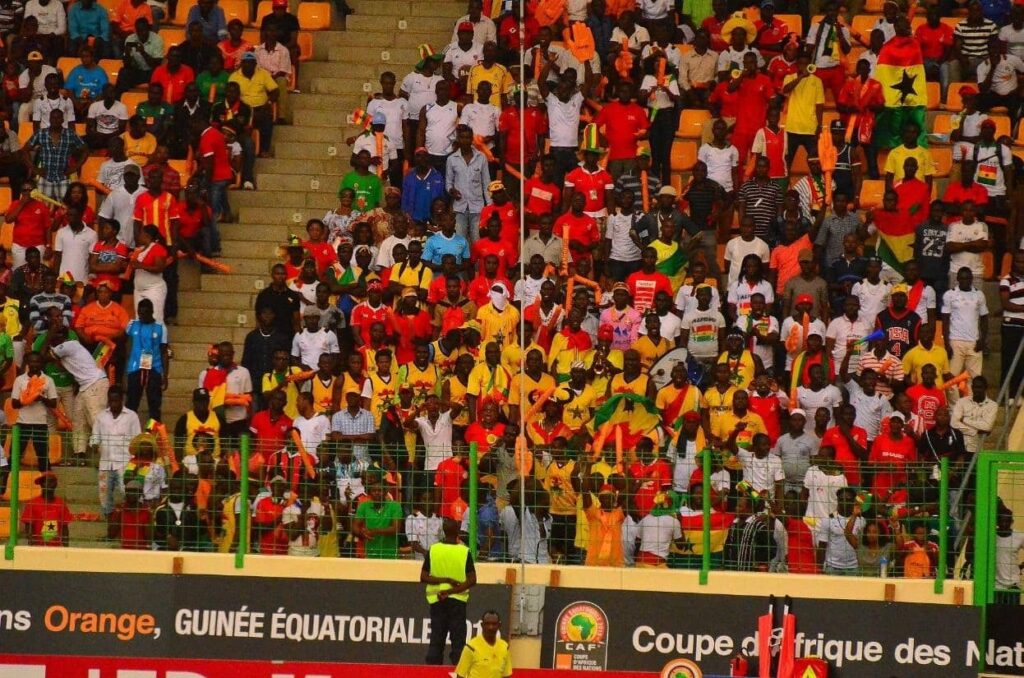
Credit: Ben Sutherland from Crystal Palace, London, UK, ACON 2015 GHA GUI (16512008192), CC BY 2.0
Nigeria and Ghana are two of the most prolific African nations when it comes to World Cup finals, with ten appearances between them.
However, Qatar 2022 will only feature the Black Stars after they eliminated the Super Eagles in their play-off in Abuja. The two sides shared a 0-0 draw four days earlier in Kumasi, meaning Ghana only needed a score draw to proceed on away goals.
Arsenal midfielder Thomas Partey gave them the lead in the 10th minute, according to Sporting News, before Ademola Lookman was brought down in the box by Dennis Odoi. Watford defender William Troost-Ekong stroked home the 21st-minute penalty to level the scores before Victor Osimhen had a strike ruled out for an offside quarter of an hour later.
Despite dominating the rest of the game, Nigeria couldn’t find a breakthrough, which means they failed to qualify for the World Cup finals for the first time since Germany 2006 and for only the second time since they first appeared at USA 94.
As for Ghana, they restored some faith after failing to make Russia 2018 and will go to Qatar hoping to go one better than 2010, when only a deliberate handball stopped them from becoming the first African team to make the semi-finals of the competition. They’re ranked in the latest Ladbrokes betting odds as less likely to do so than Senegal and Cameroon, with Tunisia and Morocco making up the contingent from Africa. Pundits and observers alike probably feel that a semi-final appearance is not just beyond Ghana, but all African nations, but a kind draw can see passage secured smoothly; look at England in 2018. Still, a qualifying draw than was kind to Nigeria didn’t see them find passage to Qatar, much to the ire of their fans.
The result in Abuja was met with violent scenes off the field, as angry Nigerian fans stormed the pitch, upset at failing to make the tournament. In 2018, they thrilled the world with some swashbuckling football, not least the stunning goal by Ahmed Musa, which helped knock Iceland out of the tournament. Memories of Jay-Jay Okocha, Emmanuel Emenike and Sunday Oliseh must have seemed a long way away as the dream of a fourth successive appearance died in front of angry fans’ eyes.
Elsewhere in qualifying, one of the world’s best players, Mo Salah, missed a penalty as Senegal defeated Egypt to secure passage to their second successive finals. Despite leading 1-0 from the first leg, Egypt was pegged back in the third minute by Boulaye Dia’s strike. They then missed three of their four spot-kicks after a goalless extra time to repeat the disappointment they endured in the AFCON final just under two months previous.
Cameroon’s qualification was perhaps the most thrilling. They trailed 1-0 from the opening leg against Algeria, but a first-half goal from Bayern Munich’s Eric Choupo-Moting levelled their tie. With just two minutes of extra time remaining, Ahmed Touba netted for Algeria, seemingly snatching the game from The Indomitable Lions. Incredibly, Karl Toko Ekambi scored four minutes into injury time to turn the game around and send them to Qatar on away goals. Cameroon is the most successful African team of all at the World Cup, with eight appearances since 1982 and one quarter-final appearance, in 1990.
Tunisia overcame Mali and prevented the West African nation from making a first-ever appearance at the finals, whilst Morocco secured passage with a dominant win against DR Congo. The Leopards were only the third African nation to qualify for a World Cup back in 1974, but Morocco proved too strong, winning 4-1 in Casablanca and progressing 5-2 on aggregate. Morocco, who first qualified for a tournament in 1970, becoming the first African team of the post-war era to appear at the finals, will make their seventh outing in Qatar, but only their third of the 21st-Century.


